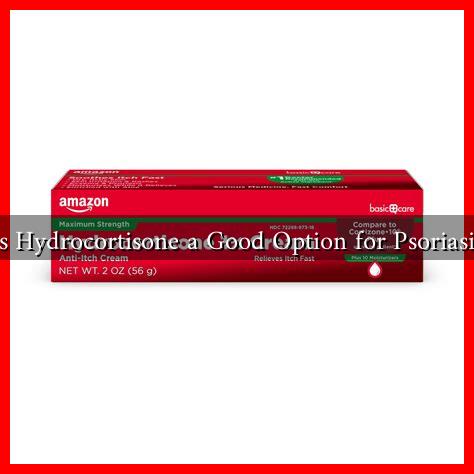-
Table of Contents
Is Hydrocortisone a Good Option for Psoriasis?
Psoriasis is a chronic autoimmune condition characterized by the rapid growth of skin cells, leading to scaling on the skin’s surface. It can be a painful and distressing condition, affecting not only the skin but also the quality of life of those who suffer from it. Among the various treatment options available, hydrocortisone, a topical corticosteroid, is often considered. But is it a good option for psoriasis? This article delves into the effectiveness, benefits, and potential drawbacks of using hydrocortisone for psoriasis management.
Understanding Hydrocortisone
Hydrocortisone is a synthetic form of cortisol, a hormone produced by the adrenal glands. It is commonly used in dermatology for its anti-inflammatory and immunosuppressive properties. Hydrocortisone is available in various forms, including creams, ointments, and lotions, and is often prescribed for conditions like eczema, dermatitis, and psoriasis.
How Hydrocortisone Works for Psoriasis
Psoriasis is driven by an overactive immune response that leads to inflammation and rapid skin cell turnover. Hydrocortisone helps to mitigate these symptoms through:
- Anti-inflammatory Action: Reduces redness, swelling, and itching associated with psoriasis.
- Immunosuppressive Effects: Decreases the immune response that contributes to the development of psoriatic plaques.
- Skin Barrier Restoration: Aids in restoring the skin barrier, which can be compromised in psoriasis patients.
Effectiveness of Hydrocortisone in Treating Psoriasis
Research indicates that hydrocortisone can be effective for mild to moderate psoriasis. A study published in the Journal of Dermatological Treatment found that patients using hydrocortisone experienced significant improvement in their symptoms compared to those using a placebo. However, its effectiveness may vary based on the severity of the condition and the specific formulation used.
Benefits of Using Hydrocortisone
There are several advantages to using hydrocortisone for psoriasis treatment:
- Accessibility: Hydrocortisone is widely available over-the-counter in lower concentrations, making it easily accessible for patients.
- Cost-Effectiveness: Compared to other psoriasis treatments, hydrocortisone is generally more affordable.
- Ease of Use: The topical application allows for targeted treatment of affected areas.
Potential Drawbacks and Side Effects
While hydrocortisone can be beneficial, it is not without its drawbacks:
- Limited Efficacy for Severe Cases: Hydrocortisone may not be effective for severe psoriasis, where stronger treatments may be necessary.
- Skin Thinning: Prolonged use can lead to skin atrophy, making the skin more susceptible to injury and infection.
- Potential for Tolerance: Over time, the skin may become less responsive to hydrocortisone, necessitating higher doses or alternative treatments.
Case Studies and Real-World Applications
In clinical practice, many dermatologists recommend hydrocortisone as a first-line treatment for mild psoriasis. For instance, a case study involving a 35-year-old patient with localized psoriasis showed significant improvement after using hydrocortisone cream twice daily for four weeks. The patient reported reduced itching and scaling, highlighting the potential benefits of this treatment.
Conclusion
In summary, hydrocortisone can be a good option for managing mild to moderate psoriasis, offering anti-inflammatory benefits and ease of use. However, it is essential to consider its limitations, particularly for more severe cases. Patients should consult with their healthcare providers to determine the most appropriate treatment plan tailored to their specific needs. While hydrocortisone can be an effective part of a broader psoriasis management strategy, it is crucial to remain vigilant about potential side effects and the need for alternative therapies as the condition evolves.
For more information on psoriasis treatments, you can visit the National Psoriasis Foundation.

